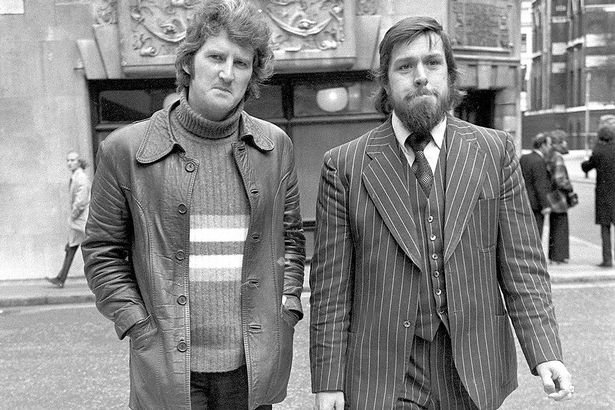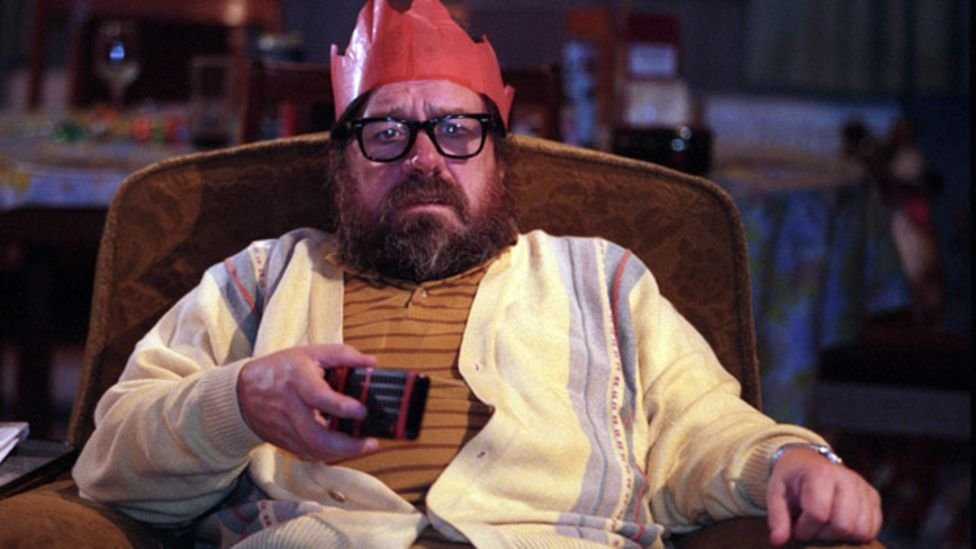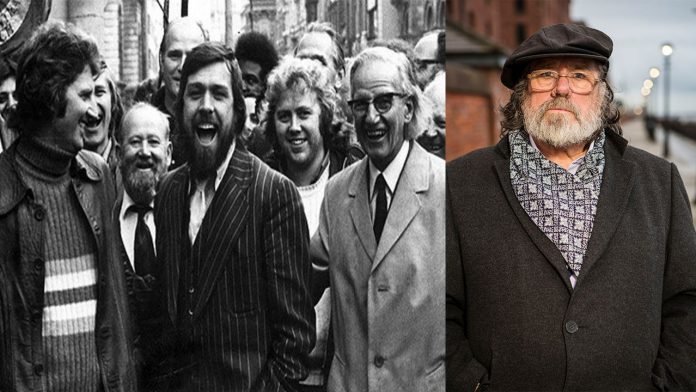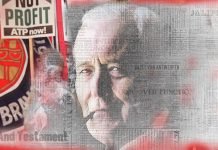The Royle Family star Ricky Tomlinson is among a group of 14 attempting to overturn their convictions at the Court of Appeal.
Before becoming one of Britain’s best-loved actors through roles in Brookside and The Royle Family, Ricky Tomlinson was controversially jailed for his part in a strike in 1972.
In 1972, Ricky Tomlinson was a plasterer in his mid-30s, living in a council house in north Wales, known by his real name Eric Tomlinson, with his familiar gift of the gab and a fiery streak.
When building workers went on a national strike that May, Tomlinson was among the leaders of a “flying picket” that visited building sites to persuade non-union members to down tools.
On 6 September, 300 members of a flying picket, including Tomlinson, visited building sites around Shrewsbury.
The year 1972 had been a torrid one for Edward Heath’s Conservative government. Strikes by miners and dockers had forced the prime minister to call two states of emergency.

Tomlinson says the pickets were asked to visit a building site (“called the Brookside site, funnily enough”) that was full of “lumpers”, casual workers who were paid lump sums and undermined the strength of the union.
Police accompanied them at all times, he points out, and made no arrests on the day.
Five months later, 24 were charged with committing offences on that day including conspiracy to intimidate, unlawful assembly and affray.
In the end, three were jailed. Tomlinson, given a two-year sentence, was among them. Fellow picket leader Des Warren got three years.
Tomlinson, Warren and the others insisted they were innocent and had been set up by the political establishment. Their treatment led to protests, bitter arguments within the Labour party and the threat of a general strike.
“Considering we were charged with conspiracy, their argument was blown to pieces because I’d only hired my coach till 12 o’clock to go as far as Oswestry,” he says.
“The guy I hired the coach off did the school run. I had to phone him at 12 o’clock to ask if we could keep the coach longer. The police were with us, these 80 police, and we had a good meeting on the site.”
‘Peaceful’ protests
Asked if there was any trouble? Tomlinson freely admits saying “Oh, there was the usual banter,” he replies without defining what he means by banter. “And fellas shouting, ‘Oh, we don’t want to come out.'”
But the meetings were not violent, he says. “I went out every day. I used to take my lad out with me – I had a five or six-year-old son. I used to take him out nine times out of 10 on my shoulders.

“We were after £30 for a 35-hour week and we were after better health and safety. In 1972/3, more people died in the building game than in the mining industry and the farming industry put together. That’s the point we had to put across.”
Tomlinson and his fellow pickets, known as the Shrewsbury 24, were convicted of offences including unlawful assembly and affray.
Six were imprisoned.
Part of the following outcry stemmed from the fact that the men had been charged with conspiracy to intimidate rather than intimidation. Simple intimidation would have carried a maximum sentence of three months. The conspiracy charge had no limit.
In the end, three were jailed. Tomlinson, given a two-year sentence, was among them. Fellow picket leader Des Warren got three years.
Tomlinson, Warren and the others insisted they were innocent and had been set up by the political establishment. Their treatment led to protests, bitter arguments within the Labour party and the threat of a general strike.
Tomlinson, who was given a two-year sentence and served 18 months in Leicester’s Welford Road jail, is among 14 of the group attempting to overturn their convictions at the Court of Appeal.
Des Warren, who was jailed for three years and died in 2004, was represented by members of his family.
Their cases were referred to the court on the basis of new evidence that some original statements had been destroyed.
The trial judge and the appeal judge acknowledged that the length of the sentences was intended as a deterrent to other strikers.
It was also claimed ITV documentary Red Under The Bed, broadcast during the first trials, unfairly affected them.
Lawyers for the former pickets said a “covert Foreign Office agency” known as the Information Research Department helped make the 1973 show. Danny Friedman QC, representing 12 of the pickets, said the IRD had consulted MI5 about the programme and added: “A covert executive agency played a part in… propagandising against the core subject matter of the proceedings.”
He added: “It is clear now that the higher echelons of the state bore responsibility for deliberate covert involvement in the production of the programme.
“In all the circumstances, the approach taken to broadcasting this programme has rendered the convictions unsafe.”
Natruly lawyers for the Crown Prosecution Service argued the convictions were safe and that the appeals should therefore be dismissed.
Ricky Tomlinson, 81, said ahead of the hearing: “It will have taken nearly 50 years for us to have our day in court and for the truth to come out.”
The judgement on todays hearing is expected at a later date.
The original protests were mobile “flying pickets” disputing pay levels.
You can help support the campaign for the Shrewsbury 24 Here
#RickyTomlinson #Shrewsbury24
Support Independent Journalism Today
Our unwavering dedication is to provide you with unbiased news, diverse perspectives, and insightful opinions. We're on a mission to ensure that those in positions of power are held accountable for their actions, but we can't do it alone. Labour Heartlands is primarily funded by me, Paul Knaggs, and by the generous contributions of readers like you. Your donations keep us going and help us uphold the principles of independent journalism. Join us in our quest for truth, transparency, and accountability – donate today and be a part of our mission!
Like everyone else, we're facing challenges, and we need your help to stay online and continue providing crucial journalism. Every contribution, no matter how small, goes a long way in helping us thrive. By becoming one of our donors, you become a vital part of our mission to uncover the truth and uphold the values of democracy.
While we maintain our independence from political affiliations, we stand united against corruption, injustice, and the erosion of free speech, truth, and democracy. We believe in the power of accurate information in a democracy, and we consider facts non-negotiable.
Your support, no matter the amount, can make a significant impact. Together, we can make a difference and continue our journey toward a more informed and just society.
Thank you for supporting Labour Heartlands












